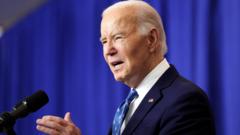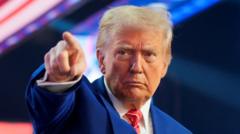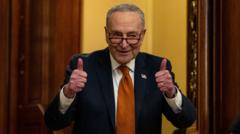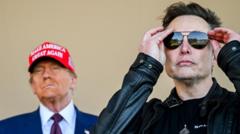Taiwan's cautious approach and high-stakes tensions with China mark a notable shift in dynamics following Trump's reelection.
Taiwan braces for a tougher relationship with Trump after his election win

Taiwan braces for a tougher relationship with Trump after his election win
The potential for escalating tensions looms as Taiwan prepares for Donald Trump's return to the presidency.
In 2016, Taiwan's president was quick to congratulate Donald Trump on his electoral victory, marking a historic moment in U.S.-Taiwan relations. Fast forward to 2024, after Trump's latest win, the tone has notably changed. Taiwan has refrained from seeking a direct congratulatory phone call with the incoming president-elect, illustrating a pivot towards a more cautious diplomatic strategy.
Former National Security Council adviser Chen Ming-chi indicates a palpable anxiety within Taiwan regarding Trump's return to power. During his campaign, Trump openly criticized Taiwan for not contributing enough to its defense and accused the island of undermining American semiconductor industries. “There is more anxiety this time,” Chen noted, emphasizing Taiwan's strategic decision to avoid ruffling feathers amid an already tense geopolitical environment with China.
Taiwan's leadership has taken a measured stance following Trump's victory, with Taiwan's Premier Lai Ching-te issuing a formal congratulatory statement—yet without invoking a phone call. This deliberate distance seems to signal a recognition of the need for a "more realistic" relationship with the U.S. president-elect, moving away from the celebratory gestures of the past.
Meanwhile, the backdrop of cross-straight tensions has never been more pronounced. Frequent military drills by China, which views Taiwan as a breakaway province, heighten the risks of conflict. Any overture towards Trump's administration could elicit a forceful response from Beijing, which remains sensitive to any perceived slights regarding Taiwan’s sovereignty.
The evolving relationship between Taiwan and the U.S. under Trump's administration will be closely scrutinized, as Taiwan navigates the treacherous waters of global diplomacy and the pressing need for defense readiness against potential incursions from China. The interactions, or lack thereof, between Taiwan and the incoming U.S. leadership will likely play a significant role in shaping the future of stability in the region.
Former National Security Council adviser Chen Ming-chi indicates a palpable anxiety within Taiwan regarding Trump's return to power. During his campaign, Trump openly criticized Taiwan for not contributing enough to its defense and accused the island of undermining American semiconductor industries. “There is more anxiety this time,” Chen noted, emphasizing Taiwan's strategic decision to avoid ruffling feathers amid an already tense geopolitical environment with China.
Taiwan's leadership has taken a measured stance following Trump's victory, with Taiwan's Premier Lai Ching-te issuing a formal congratulatory statement—yet without invoking a phone call. This deliberate distance seems to signal a recognition of the need for a "more realistic" relationship with the U.S. president-elect, moving away from the celebratory gestures of the past.
Meanwhile, the backdrop of cross-straight tensions has never been more pronounced. Frequent military drills by China, which views Taiwan as a breakaway province, heighten the risks of conflict. Any overture towards Trump's administration could elicit a forceful response from Beijing, which remains sensitive to any perceived slights regarding Taiwan’s sovereignty.
The evolving relationship between Taiwan and the U.S. under Trump's administration will be closely scrutinized, as Taiwan navigates the treacherous waters of global diplomacy and the pressing need for defense readiness against potential incursions from China. The interactions, or lack thereof, between Taiwan and the incoming U.S. leadership will likely play a significant role in shaping the future of stability in the region.





















